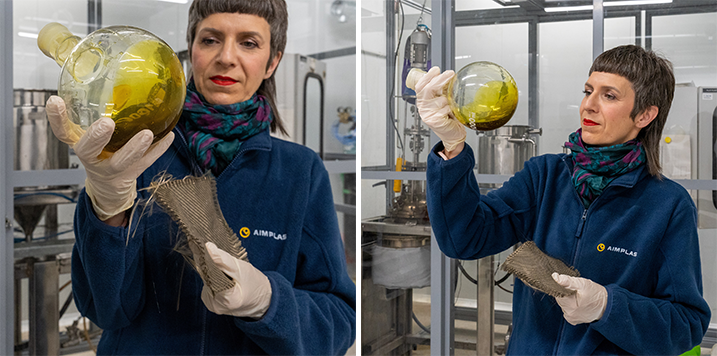 04 July, 2023
04 July, 2023The aviation industry is increasing the use of biocomposite materials in its components in order to mitigate its environmental impact. Biocomposites are reinforced using natural fibres and resins from renewable sources. However, the novelty and heterogeneity of these materials, their thermostable nature and the fact that they do not contain carbon fibres, with a high market value, makes it hard to provide an efficient solution for managing them when they reach the end of their useful life and become waste.
AIMPLAS, Instituto Tecnológico del Plástico, and the Dutch centre TNO have completed project ELIOT, which has enabled an in-depth review of the current recycling technologies both for composites and for biocomposites used in the aeronautics sector to analyse the most technically feasible alternatives at pilot plant scale, and viable from a technical and economic standpoint. As a result of the study, from the 12 technologies analysed, solvolysis is the best method for recycling six different composites.
This study contributes to promoting recycling technologies at an efficient cost that enable the aeronautics industry to guarantee the sustainability of its components when searching for new solutions aligned with the Circular Economy.
The results show that pyrolysis emits 17% more carbon dioxide and consumes double the amount of heat that solvolysis does, which implies a higher associated cost. Solvolysis uses solvents instead of heat, but these are recovered in a highly efficient manner and reused in the process. Furthermore, solvolysis has been proven to work even better when the biocomposite is larger.
In both cases, pyrolysis and solvolysis, additional purification stages are needed to take advantage of the pyrolytic liquid and the distilled product, respectively. The estimates have been carried out on a processing plant with a treatment capacity of 10 kilotons of biocomposite per year.
Other technologies analysed throughout the study are mechanical recycling, dissolution, enzymatic degradation, gasification or composting.
The ELIOT project has received financing from the European research and investigation programme, Horizonte 2020, within the framework of the Clean Sky Joint Technology Initiative, under financing agreement number 886416.
Subscribe to our newsletter. Just insert your e-mail and you will receive the latest news.